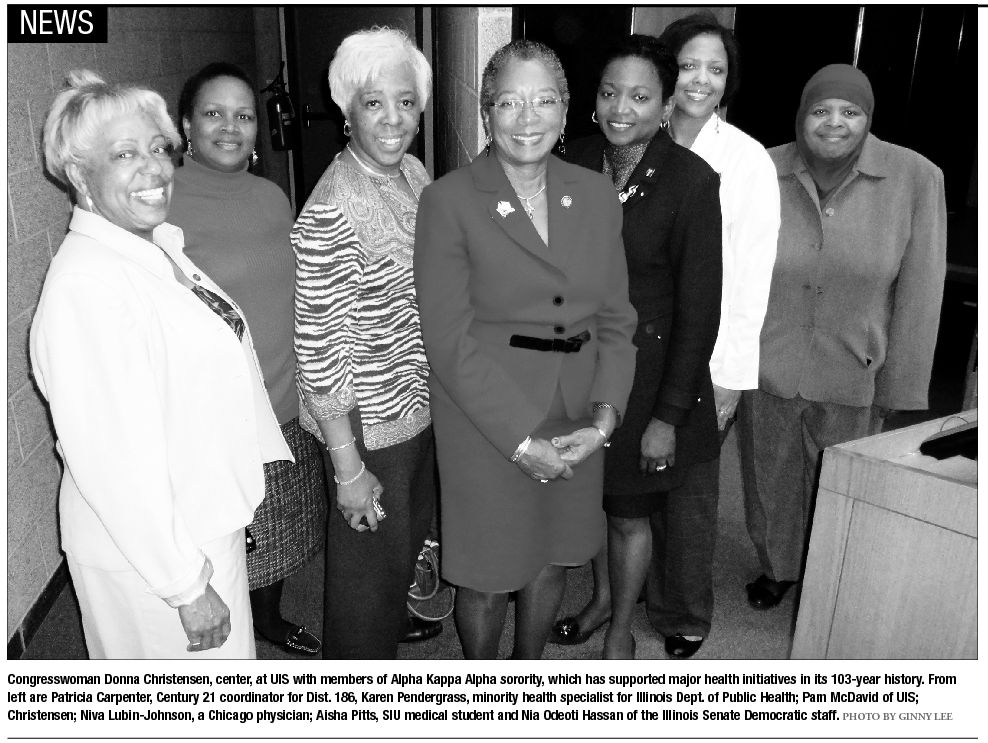
‘Health care is a civil rights issue’
Congresswoman addresses “stubborn disparity” in health care between whites and blacks
HEALTH | Ginny Lee
“Health care is the civil rights issue of the 21st century,” Donna Christensen, a member of Congress, stated Monday evening at the SIU School of Medicine in Springfield. The congresswoman from the U.S. Virgin Islands spoke on “Ethics, Race and Class” to members of the medical community and others.
Christensen is a former practicing family physician and current vice chair of the Congressional Black Caucus. She reminded the audience that the U.S. is the only industrialized country in the world that does not provide health care for its citizens.
Though the Congressional Black Caucus has existed for 40 years, Christensen said, progress on issues has been minimal.
“In 2000, minorities received fewer tests and less sophisticated treatment for a panoply of ailments,” Christensen said, “including heart disease, cancer, diabetes and HIV/AIDS.” African Americans have the highest death rate from breast cancer in this country, she said, and African Americans are 3 ½ times more likely than white diabetics to have a lower limb amputation.
African Americans without health insurance have a 78 percent greater chance of dying than insured white Americans, Christensen said. “If you are poor and of color, there is a double whammy,” she added.
Christensen noted the 1985 Heckler Report, which documented the continuing disparity in the deaths and illnesses experienced by blacks and other minority Americans. The report shows that the “stubborn disparity” that civil rights pioneer W.E.B. Dubois spoke of at the turn of the century persists today.
“We could have had a much better, stronger health care bill if it were based on ethics,” Christensen said. “What ethical standards leave 47 million people without health care? Without ethical implementation, the whole health care program will fail. It will take stronger intervention from the White House to maintain the health care bill.”
The National Institutes of Health in Atlanta has created the National Center on Minority Health and Health Disparities, Christensen said, but it is an organization in name only.
Christensen, who has served in Congress for 14 years, called for ethics, race and class to be at the forefront of health care in this country. A single payer plan, or Medicare for All, will be introduced in Congress again, she said. She quoted Martin Luther King, Jr., who said, “Of all forms of discrimination and inequalities, injustice in health care is the most shocking and inhumane.”
Jane Treadwell, university librarian at the University of Illinois Springfield, is credited for inviting Christensen to speak in Springfield. “Some of us (in the group Friends of Brookens Library) were reading The Immortal Life of Henrietta Lacks,” Treadwell said. Treadwell knew of Congresswoman Christensen’s commitment to minority health care, and with the large medical community in Springfield, she suggested her as a speaker.
Henrietta Lacks was a mother of five in Baltimore who died at age 30 in 1951 from an aggressive cancer. Doctors saved some of her tissue to use for research without telling her family. Years later when family members learned what had happened, they felt deceived by the medical community. Author Rebecca Skloot researched the history of Henrietta’s cells for 10 years before publishing her book.
Contact Ginny Lee at [email protected].